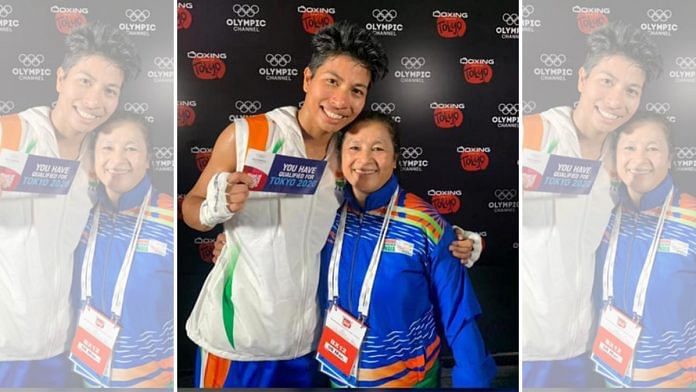New Delhi: As the country celebrated Assam pugilist Lovlina Borgohain’s medal win at the Tokyo Olympics, in the neighbouring state of Sikkim, Sandhya Gurung’s heart swelled with pride.
After all, Gurung, a former national-level boxer and Borgohain’s coach, had been instrumental in the latter’s transformation from a ‘reluctant sparrer to a lion in the ring’.
“She was a tall, shy girl, but the height advantage got her the attention from Assam in sub-junior camp. She was a bit reluctant in sparring, but we pushed her to fight that fear. Her target was always on the Olympics, ever since she went for the sub-junior world championship in 2013,” Gurung told EastMojo.
Last week, 23-year-old Borgohain assured India of its first boxing medal at the ongoing Olympic Games in Tokyo when she defeated former world champion Nien-Chin Chen to enter the semifinals.
Gurung’s own story is no less incredible. Hailing from Gangtok’s Burtuk area, she fought paralysis to become a national-level pugilist. She was later selected as a coach for the national camp.
“When she (Borgohain) became a senior around November 2016, she came to me with a request for training…My message to mentor her was no excuse for anything in training, take me as a friend or parent, and she has been sincere in her game and disciplined in her training,” added Gurung.
Oldest Assamese, Singpho and Nocte spelling book ‘acquired’ from Yale University library
Nocte Digest, a community digital platform, has recently acquired the first digital copy of a book named ‘A Spelling Book in English, Assamese, Singpho and Naga (Nocte)’ from the Beinecke Rare Book & Manuscript Library of Yale University in the US.
The book is considered to be the oldest known written record of the Nocte and Singpho languages. Nocte is spoken by the Nocte tribe of Arunachal Pradesh whose ancestry can be traced to Myanmar. Singpho is a dialect of the Jingpo language spoken by the Singpho people of Arunachal Pradesh.
The book was published in 1839 by American Baptist missionary Miles Bronson.
Editor of Nocte Digest, Wangtum H. Lowang, acquired the book with the help of Stephen Morey of La Trobe University, Australia, Rikken Dockum of Swarthmore College, US, and Dr Luke Lindemann of Yale University.
It is believed the book will be a window for the Nocte and Singpho tribes to understand how their ancestors spoke 182 years ago.
Also read: Kuki identity at the heart of a music revival project in Manipur
Tiny Arunachal village becomes a model hamlet in de-addiction initiative
Jongphohate, a small village located in Arunachal Pradesh’s Changlang district, was once a hub of drug abuse, affecting both the young and old. The village has 59 households, with only 322 members.
But earlier this week, as many as 32 villagers of Jongphohate came forward to surrender their smoking pipes. These pipes were traditionally used to consume opium. Having ornate designs, these bamboo smoking pipes are mainly made by the Tikhak sub-tribe of the state’s Tangsa community.
The Changlang district police later donated one carrom board to a de-addiction centre located in the village to help reformers keep their minds occupied.
The smoking pipes were also burnt in a symbolic act, urging others to follow suit.
‘Want to meet truckers who provided lifts, seek their blessings’: Mirabai Chanu
Mirabai Chanu, the Olympic medallist from Manipur’s Nongpok Kakching village, still remembers those days when she would take lifts from truck drivers to reach her training centre in Imphal.
“I wanted to see the truckers who provided me regular lifts from home to the training centre and seek their blessing,” the 26-year-old athlete was quoted as saying.
“They really helped me during my hard times of training. I’m looking for those sand-carrying truckers so that I can try to extend whatever the help they may require now,” she added.
Chanu recently ended India’s 21-year wait for a weightlifting medal at the Olympics by clinching a silver medal in the 49kg category.
Her mother, Saikhom Ongbi Tombi Devi, who runs a tea stall also recollected how trucks coming from the Etham Moirangpurel area would stop for refreshments at her tiny shop and often give a lift to Chanu.
The transportation money that Chanu saved by taking lifts was used to provide for a proper diet during her training days.
“The training centre used to be 20-30 km away from our home. Our parents would give her Rs 10-20 for her journey. The village is very small and almost everyone knows everyone else. Early morning, trucks used to leave from the market square. We would know which of them is going towards her training centre and would send her with them. She never complained about it. She would go alone every day,” Chanu’s brother Saikhom Sanatomba Meitei said.
Also read: New Mexico now has a ‘Dr Jonathan Iralu Day’, in name of Naga-origin doctor on Covid frontline



